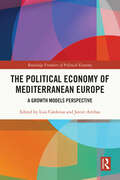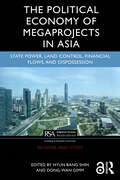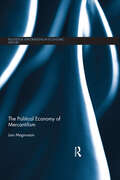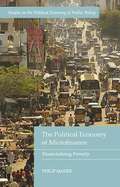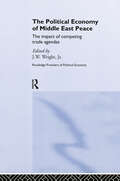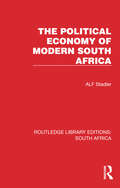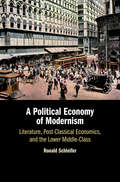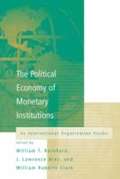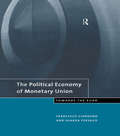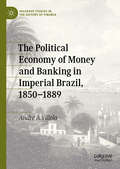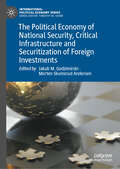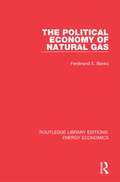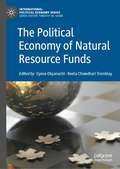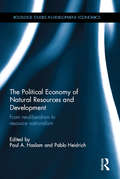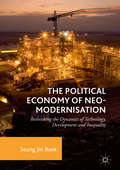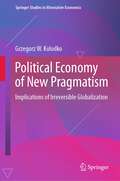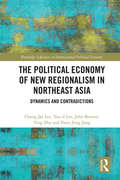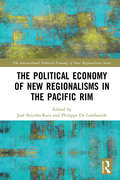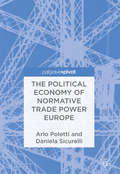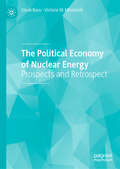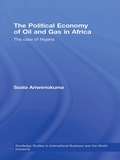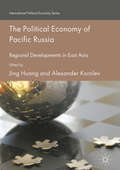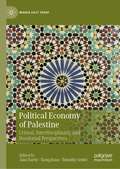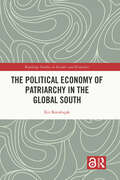- Table View
- List View
The Political Economy of Mediterranean Europe: A Growth Models Perspective (Routledge Frontiers of Political Economy)
by Luis Cárdenas Javier ArribasApplying the demand-led growth models framework, this book examines the recent macroeconomic performance of the key Mediterranean economies – Italy, Spain, Portugal and Greece – including the responses to the economic and financial crisis (2008), the debt crisis (2010) and the COVID-19 crisis (2020).As the book explains, the central idea of the growth model approach is that the widespread breakdown of the old labor institutions, such as the existence of strong unions, centralized wage bargaining and the participation of the workforce in corporate governance, has led to a fall in the wage share and a rise in inequality in most advanced economies. Thus, the two main contemporary growth models are usually characterized as debt-led and export-led. In both models, the same processes that cumulatively drive growth, such as over-consumption, also simultaneously undermine the foundations on which this expansion takes hold.The book examines the extent to which these processes hold true for Mediterranean economics and explores the key factors of their economies including productive capacity, growth of aggregate demand components, wage-led or profit-led regimes, personal income distribution, the foreign sector, the financial sector, labor relations, the labor market and welfare states. In particular, the book examines whether policy responses and state interventions in recent years have led to a divergence between the economies. To what extent are these changes transforming the existing growth models? Are we facing a change in the Mediterranean model or the disappearance of the Mediterranean bloc as a whole?This book marks a significant addition to the literature on the economics and politics of Southern Europe and the fields of political economy, comparative economics, and macroeconomics more broadly.
The Political Economy of Megaprojects in Asia: State Power, Land Control, Financial Flows, and Dispossession (Regions and Cities)
by Hyun Bang Shin Dong-Wan GimmThis book offers a comprehensive analysis of how the developmental goals of Asian states are reflected in large-scale projects and how various actors both realize and challenge these goals. The rise of Asian economies has spurred the proliferation of megaprojects through large-scale resource mobilization, necessitating varying degrees of state intervention. Despite neoliberal pressures, these projects remain linked to national developmental aspirations, driven by domestic, transnational, or combined pro-growth interests, and serve multiple political purposes.The book advances the argument that megaprojects embody the dynamics of multiscalar strategic relations that determine the process and outcome of urbanization. These projects create iconic landmarks, new towns, central business districts, and infrastructure, showcasing intertwined political and economic interests. By examining contemporary megaprojects in China, South Korea, Taiwan, India, Malaysia, and Turkey, the contributing authors reveal the complexity of urbanizing forces and their multiscalar nature in shaping the built environment and shed light on the intricate interplay of state strategies, economic needs, and sociopolitical forces that influence urban landscapes.This interdisciplinary work provides a nuanced understanding of the political economy underpinning Asian urbanization and contributes to ongoing debates on urban development, state–society relations, and the production of space in the context of globalization.Chapter 1 of this book is freely available as a downloadable Open Access PDF at http://www.taylorfrancis.com under a Creative Commons Attribution-Non Commercial-No Derivatives (CC BY-NC-ND) 4.0 license.
The Political Economy of Mercantilism (Routledge Explorations in Economic History)
by Lars MagnussonSince the days of Adam Smith, Mercantilism has been a hotly debated issue. Condemned at the end of the 18th century as a "false" system of economic thinking and political practice, it has returned paradoxically to the forefront in regard to issues such as the creation of economic growth in developing countries. This concept is often used in order to depict economic thinking and economic policy in early modern Europe; its meaning and content has been highly debated for over two hundred years. Following on from his 1994 volume Mercantilism – The Shaping of an Economic Language, this new book from Lars Magnusson presents a more synthetic interpretation of Mercantilism not only as a theoretical system, but also as a system of political economy. This book incorporates samples of material from the 1994 publication alongside new material, ordered in a new set of chapters and up-date discussions on mercantilism up to the present day. Tracing the development of a particular political economy of Mercantilism in a period of nascent state making in Western and Continental Europe from the 16th to the 18th century, the book describes how European rulers regarded foreign trade and industrialisation as a means to achieve power and influence amidst international competition over trades and markets. Returning to debates concerning whether Mercantilism was a system of power or of wealth, Magnusson argues that it is in fact was both, and that contemporaries almost without exception saw these goals as interconnected. He also emphasises that Mercantilism was an all-European issue in a time of trade wars and the struggle for international power and recognition. In examining these issues, this book offers an unrivalled modern synthesis of Mercantilist ideas and practices.
The Political Economy of Microfinance
by Philip MaderThis book helps to understand the enigmatic microfinance sector by tracing its evolution and asking how it works as a financial system. Our present capitalism is a financialized capitalism, and microfinance is its response to poverty. Microfinance has broad-ranging effects, reaching hundreds of millions of people and generating substantial revenues. Although systemic flaws have become obvious, most strikingly with the 2010 Indian crisis that was marked by overindebtedness, suicides and violence, the industry's expansion continues unabated. As Philip Mader argues, microfinance heralds less the end of poverty than new, more financialized forms of poverty. While microfinance promises to empower, it generates discipline and extracts substantial resources from the poor, producing new crises and new forms of dispossession.
The Political Economy of Middle East Peace: The Impact of Competing Trade Agendas (Routledge Frontiers of Political Economy #19)
by J. W. WrightThe Political Economy of Middle East Peace looks at the political economy of the Middle Eastern peace process with a focus on the politics of trade. Contributors investigate the ways new commercial alliances develop as a result of economic agencies established via the Arab-Israeli peace process and look at institutions which contribute to redirection of Arab intra- and inter-regional trade, such as the Palestine Monetary Authority, the Middle East Development Bank and free trade zone agencies in Aquaba and Dubai.
The Political Economy of Modern South Africa (Routledge Library Editions: South Africa #17)
by Alf StadlerOriginally published in 1987 this book argues that South African politics reflect the changing ways in which the region has been incorporated into the world economy. It traces the effects of a process of industrialisation under the dominance of mining on the other sectors of the economy, and on the evolution of the class structure. It shows how a coercive labour system influenced the definition of political and social rights in racial terms and profoundly influenced the development of authoritarian controls over blacks in the urban and rural areas from the 1920s onwards. The book includes an essay on the different strands in the reform movement and speculates about the social and political forces which underlined the political changes which began to take place during the mid-1970s.
A Political Economy of Modernism: Literature, Post-Classical Economics, and the Lower Middle-Class
by Ronald SchleiferIn A Political Economy of Modernism, Ronald Schleifer examines the political economy of what he calls 'the culture of modernism' by focusing on literature and the arts; intellectual disciplines of post-classical economics; and institutional structures of corporate capitalism and the lower middle-class. In its wide ranging study focused on modernist writers (Dreiser, Hardy, Joyce, Stevens, Woolf, Wells, Wharton, Yeats), modernist artists (Cézanne, Picasso, Stravinsky, Schoenberg), economists (Jevons, Marshall, Veblen), and philosophers (Benjamin, Jakobson, Russell), this book presents an institutional history of cultural modernism in relation to the intellectual history of Enlightenment ethos and the social history of the second Industrial Revolution. It articulates a new method of analysis of the early twentieth century - configuration and modeling - that reveals close connections among its arts, understandings, and social organizations.
The Political Economy of Monetary Institutions
by William T. Bernhard J. Lawrence Broz William Roberts ClarkRecent analysis by political economists of monetary institution determinants in different countries has been limited by the fact that exchange rate regimes and central bank institutions are studied in isolation from each other, without examining how one institution affects the costs and benefits of the other. By contrast, the contributors to this volume analyze the choice of exchange rate regime and level of central bank independence together; the articles (originally published in a special issue of International Organization) constitute a second generation of research on the determinants of monetary institutions. The contributors consider both economic and political factors to explain a country's choice of monetary institutions, and examine the effect of political processes in democracies, including interest group pressure, on the balance between economic and distributional policy.
The Political Economy of Monetary Union: Towards the Euro
by Francesco Giordano Sharda PersaudThis book places the whole issue of monetary union in its wider political economic context. The authors discuss: * the effect of EMU on fiscal and monetary policies * Central bank independence * the impact of EMU on unemployment * ERM II * international perspectives. Drawing on their experience in the European financial markets, the authors use a non-technical approach to discuss these issues - both in a general european sense and more specifically, Germany, the UK and Italy.
The Political Economy of Money and Banking in Imperial Brazil, 1850–1889 (Palgrave Studies in the History of Finance)
by André A. VillelaThis book uncovers the extent to which government policy in mid nineteenth-century Brazil followed the interests of the all-powerful coffee growing class. The testing ground for this question is monetary and banking policy, an area in which exporters and the Brazilian government were often at loggerheads. The development of the monetary and banking regime during the second half of the Brazilian Empire (1850-89) is examined in a chronological and thematic way. The book establishes two major points of historical fact: the peculiar nature of the monetary standard adopted in Brazil during part of the period, as well as the role of the Bank of Brazil therein. Additionally, the analysis broadens current knowledge of three of the major contemporary events in the financial sphere – the 1860 banking and corporate law, the Souto crisis of 1864 and the 1875 financial crisis that brought down Mauá’s business empire. This book will be of interest to academics, both as secondary literature for their own research and as material that could be used in class at the advanced undergraduate or graduate levels. It will appeal to those interested not only in Brazilian economic and financial history, but also to students of political economy in general.
The Political Economy of National Security, Critical Infrastructure and Securitization of Foreign Investments (International Political Economy Series)
by Jakub M. Godzimirski Morten Skumsrud AndersenThis book examines how new flows of foreign direct investments from autocracies are framed, their effects, and the policy responses to them, within the context of challenges to the international liberal order. Chapters address thematic and regional issues, from national investment controls and threat perceptions to China and Russia’s responses. Collectively, they explore a new dynamic in international politics: the securitization of money crossing borders. Historically, foreign investments operated under minimal global regulation, based on the assumption that they were beneficial, and profit driven. However, the past decade has witnessed a radical shift in approaches to foreign investments due to changing investment patterns and the entry of state-sponsored actors into this traditionally unregulated realm. China and Russia are seen to leverage foreign investments to advance their long-term economic and political objectives. The book comprehensively examines the subsequent repositioning of foreign investment policy and its consequences for national and international politics.
The Political Economy of Natural Gas (Routledge Library Editions: Energy Economics)
by Ferdinand E. BanksOriginally published in 1987 this book presents a comprehensive survey of the global natural gas industry: it looks at the problems of supply, the pattern of demand, the economics of the industrya nd how the industry in the 1980s was being affected by changes in other energy sectors. As a key commodity in the world economy the supply of natural gas is increasingly affecting and changing international relations between importer and supplier countries: the siberian natural gas pipeline which supplies Soviet gas to Western Europe is a key example of the impact of natural gas on international relations and one which is discussed in the book.
The Political Economy of Natural Resource Funds (International Political Economy Series)
by Reeta Chowdhari Tremblay Eyene OkpanachiThis book aims to foster a better understanding of the particular challenges faced by resource-dependent countries or jurisdictions in managing their resource revenues through natural resource funds (NRFs). It explores the varieties of natural resource management strategies as dictated primarily by domestic politics, and how the potential negative distributional consequences of resource wealth management (the resource curse) may add political dimensions and potential conflicts to decisions about NRFs in ways that other sovereign wealth funds (SWFs) do not experience.By bridging the existing academic and practical knowledge gap arising from the limited attention given to the domestic politics of NRFs and state-society relations, this edited book is a valuable resource for academics, policymakers, and civil society actors in resource-driven economies and especially those interested in learning from comparative experiences of natural resource wealth management through NRFs.
The Political Economy of Natural Resources and Development: From neoliberalism to resource nationalism (Routledge Studies in Development Economics)
by Paul A. Haslam Pablo HeidrichThe Political Economy of Resources and Development offers a unique and multidisciplinary perspective on how the commodity boom of the mid-2000s reshaped the model of development throughout Latin America and elsewhere in the developing world. Governments increased taxes and royalties on the resource sector, the nationalization of foreign firms returned to the mainstream economic policy agenda, and public spending on social and developmental goals surged. These trends, often described as resource nationalism, have developed into a strategy for economic development, generated a re-imagining of the state and its institutional possibilities, and created a new but very significant political risk for extractive enterprises. However, these innovations, which constitute the most dramatic change in development policy in Latin America since the advent of neoliberalism, have so far received little attention from either academic or policy-oriented publications. This book explores the reasons behind these policies, and their effects on states, firms, and development trajectories. This text brings together renowned thematic experts to examine the political-economic causes of resource nationalism, as well as its manifestation in six Latin American countries. The causal variables considered by the contributors to this collection include a range of political-economic determinants of policy including commodity prices; the influence of ideology and national politics; ideas about industrial policy; relations between host governments and investors; and how countries respond to opportunities provided by regional initiatives and the new geography of the global economy. This volume is essential reading in development economics, political economy, and Latin American studies, as well as for those who want to understand what economic development means after neoliberalism.
The Political Economy of Neo-modernisation: Rethinking the Dynamics of Technology, Development and Inequality
by Seung Jin BaekIs there a limit to technological advancements? Are technological advancements creating a more equal and fair world? Starting from influential thinkers driving a never-ending evaluation of development discourse – incorporating theories of modernisation, endogenous growth, globalisation, neoliberalism and several others – Seung-Jin Baek answers these questions and sets out practical steps to create societies that are more equal in the Fourth Industrial Revolution. This book explores why Western-centred development strategies are unlikely to bring about similar developmental paths and outcomes in developing economies. By theoretically and empirically assessing the Technology-Development-Inequality nexus, Baek explores why a distorted developmental path has been observed in recent years, with high income countries being associated with rising inequality. This is important reading for all those seeking to understand international development in a twenty-first century context.
Political Economy of New Pragmatism: Implications of Irreversible Globalization (Springer Studies in Alternative Economics)
by Grzegorz W. KolodkoThis book provides answers to fundamental questions of sustainable development and international cooperation in light of irreversible globalization. Based on comprehensive research and a wealth of experience from his own political activities, the author offers an insightful analysis of the globalized economy and its political, cultural and ecological context. Presenting an objective assessment, the author diagnoses the state of affairs and formulates recipes to overcome present day challenges, such as income inequalities, climate change, demographic imbalance and the new Cold War, which overlap with the “black trinity”: populism, nationalism and authoritarianism. "Grzegorz Kolodko is one of the most acute observers of the international economy, based on long experience both as a practitioner and as an academic. His writings are always an important starting point for debate and discussion about the political economy of globalization." Francis Fukuyama, Stanford University, author of “The End of History” "Grzegorz Kolodko unites deep policy experience, a vast breadth of observation and a solid grip on real-world economics in his case for a new pragmatism. For all involved in the causes of peace, justice, shared prosperity and public purpose, he is a leader and an ally." James K. Galbraith, The University of Texas at Austin "Dr. Kolodko delivers comprehensive and inspiring economic analysis, drawing on his rich historical political leadership. His probing and insightful assessment of globalization in today's and tomorrow's world is a must read." Rev. Jesse L. Jackson, President of Rainbow Coalition and International Civil Rights Activist
The Political Economy of New Regionalism in Northeast Asia: Dynamics and Contradictions (Routledge Advances in International Political Economy)
by Chang Jae Lee You-il Lee John Benson Ying Zhu Yoon-Jong JangThe book is the first attempt to offer a holistic and integrated exploration of the political-economic framework underpinning economic regionalism. In doing so it provides a much-needed contribution to the literature on international political economy, international relations and Asian political economy in relation to economic regionalism. The existing literature provides broad generalizations and limited discussion on economic integration (i.e. free trade agreements, FTA) with most analyses of regionalism generally contained to the field of economics with a focus on the welfare implications of FTAs, both for participating countries and the world as a whole. Readers of this book can view economic regionalism from a variety of perspectives with input from Chinese, Japanese and Korean research institutes, business and industry groups, and government officials. Drawing on the considerable country experience and expertise of the authors, the book attempts to unravel the paradox of the market-driven economic globalization process (regionalism) and address a serious gap in the current literature relating to the political-economic characteristics and strategies of China, Japan and Korea in relation to economic regionalism.
The Political Economy of New Regionalisms in the Pacific Rim (New Regionalisms Series)
by Jose Briceno Ruiz Philippe A. A. De LombaerdeCombining an analysis of regionalism from a systemic view with a domestic political-economy analysis, this book sheds light on the new dynamics and emerging configurations of regionalisms and interregionalisms in the post-Trans-Pacific Partnership (TPP). Donald Trump’s presidency has transformed trans-Pacific economic and political relations, contrasting sharply with President Obama’s ‘pivot to Asia’ strategy. Unilateralism and bilateralism have returned to the center stage, at the cost of regionalism, interregionalism, and multilateralism. Understanding these new dynamics requires closer examination of the underlying domestic political economies. Examining ten country case studies of multi-actor agency at the national level, expert contributors argue that trans-Pacific relations should not only be explained in terms of the behavior of the major powers, but that medium powers, and even small countries, can exert influence and occupy strategic nodes and contribute to shaping a new international relations network. Their findings will be of interest to scholars of international relations, international political economy, regionalism, and international economics.
The Political Economy of Normative Trade Power Europe
by Daniela Sicurelli Arlo PolettiThis book critically engages with a long tradition of scholarly work that conceives of the European Union as a peculiar international actor that pursues a value-based, normatively oriented and development-friendly agenda in its relations with international partners. The EU is a pivotal player in international trade relations, holding formidable power in trade but also exercising substantial power through trade. Trade policy therefore represents a strategic field for the EU to shape its image as a healthy economy and a global power. In this field, the EU has declared a twofold ambitious goal, namely that of fostering economic growth in Europe while, at the same time, promoting development and growth abroad, both in developed and developing countries. In other words, the EU aims to increase its competitiveness in world trade while acting as an ethical and normative power. Here, Poletti and Sicurelli explore the tension between these two roles.
The Political Economy of Nuclear Energy: Prospects and Retrospect
by Dipak Basu Victoria W. MiroshnikUsing primarily Russian sources, this book explains the political and economic aspects of nuclear power. The nuclear fuel cycle is described, from the mining of natural uranium to the ultimate power generation, and to reprocessing to produce plutonium which is essential for both electricity generation and for weapons production. Historical aspects of nuclear developments in Germany, the USA, India, China and the Soviet Union are also considered and explained. The book then proceeds to argue that Russia is more powerful today in its nuclear weapons system and delivery than ever before, and that it is precisely this which has provoked President Trump to cancel the strategic nuclear weapons reduction treaty.
The Political Economy of Oil and Gas in Africa: The case of Nigeria (Routledge Studies In International Business And The World Economy Ser.)
by Soala AriweriokumaThe evolution of the Nigerian oil and gas industry spanned about a century during which several challenges were encountered and surmounted by major International Oil Companies (IOCs). This book provides a thoroughly researched guide to the Nigerian oil and gas industry. The author examines the increasing role of Africa in the contributi
The Political Economy of Pacific Russia
by Jing Huang Alexander KorolevThis thought-provoking book, edited by Jing Huang and Alexander Korolev, redefines the complex political and economic landscape of the Asia-Pacific region. Written by internationally recognized experts from Russia, China, South Korea, Japan, Norway and Singapore, it provides an in-depth analysis of international cooperation in the development of Russia's Far East and Siberia. It explores the geo-economic and geopolitical standing of 'Pacific Russia', and examines both the factors that lie behind, and the mechanisms that allow its integration into Asia. The authors argue that such development is essential for diversifying Russia's economy, but that this turn to Asia is still inconsistent and would benefit from being truly international and multilateral. The protracted crisis in relations between Russia and the West, they point out, has only made it more significant. This edited volume will appeal to political scientists, economists, scholars of development studies and international relations, and policy-makers.
Political Economy of Palestine: Critical, Interdisciplinary, and Decolonial Perspectives (Middle East Today)
by Alaa Tartir Tariq Dana Timothy SeidelThis book explores the political economy of Palestine through critical, interdisciplinary, and decolonial perspectives, underscoring that an approach to economics that does not consider the political—a de-politicized economics—is inadequate to understanding the situation in occupied Palestine. A critical interdisciplinary approach to political economy challenges prevailing neoliberal logics and structures that reproduce racial capitalism, and explores how the political economy of occupied Palestine is shaped by processes of accumulation by exploitation and dispossession from both Israel and global business, as well as from Palestinian elites. A decolonial approach to Palestinian political economy foregrounds struggles against neoliberal and settler colonial policies and institutions, and aids in the de-fragmentation of Palestinian life, land, and political economy that the Oslo Accords perpetuated, but whose histories of de-development over all of Palestine can be traced back for over a century. The chapters in this book offer an in-depth contextualization of the Palestinian political economy, analyze the political economy of integration, fragmentation, and inequality, and explore and problematize multiple sectors and themes of political economy in the absence of sovereignty.
The Political Economy of Patriarchy in the Global South (Routledge Studies in Gender and Economics)
by Ece KocabıçakRecent decades have witnessed both a renewed energy in feminist activism and widespread attacks taking back hard-won rights. Despite powerful feminist movements, the Covid-19 pandemic has significantly undermined the progress women have struggled for decades to achieve; how can this be? What explains this paradox of a strong feminist movement coexisting with stubborn patriarchal arrangements? How can we stop the next global catastrophe initiating a similar backlash? This book suggests that the limitations of social theory prevent feminist strategies from initiating transformative changes and achieving permanent gains. It investigates the impact of theoretical shortcomings upon feminist strategies by engaging with two clusters of work: ungendered accounts of capitalist development and theories on gendered oppression and inequality. Decentring feminist theorising grounded in histories and developments of the global North, the book provides an original theory of the patriarchal system by analysing changes within its forms and degrees as well as investigating the relationship between the gender, class and race-ethnicity based inequalities. Turkey offers a case that challenges assumptions and calls for rethinking major feminist categories and theories, thereby shedding light on the dynamics of social change in the global South. The timely intervention of this book is, therefore, crucial for feminist strategies going forward. The book emerges at the intersections between Gender, International Development, Political Economy, and Sociology and its main readership will be found in, but not limited to, these disciplinary fields. The material covered in this book will be of great interest to students and researchers in these areas as well as policy makers and feminist activists. Since publication it has been nominated for the prestigious 2023 British Sociological Association's Philip Adams Memorial Prize.
The Political Economy of Patriarchy in the Global South (Routledge Studies in Gender and Economics)
by Ece KocabıçakRecent decades have witnessed both a renewed energy in feminist activism and widespread attacks taking back hard-won rights. Despite powerful feminist movements, the Covid-19 pandemic has significantly undermined the progress women have struggled for decades to achieve; how can this be? What explains this paradox of a strong feminist movement coexisting with stubborn patriarchal arrangements? How can we stop the next global catastrophe initiating a similar backlash? This book suggests that the limitations of social theory prevent feminist strategies from initiating transformative changes and achieving permanent gains. It investigates the impact of theoretical shortcomings upon feminist strategies by engaging with two clusters of work: ungendered accounts of capitalist development and theories on gendered oppression and inequality. Decentring feminist theorising grounded in histories and developments of the global North, the book provides an original theory of the patriarchal system by analysing changes within its forms and degrees as well as investigating the relationship between the gender, class and race-ethnicity based inequalities. Turkey offers a case that challenges assumptions and calls for rethinking major feminist categories and theories, thereby shedding light on the dynamics of social change in the global South. The timely intervention of this book is, therefore, crucial for feminist strategies going forward.The book emerges at the intersections between Gender, International Development, Political Economy, and Sociology and its main readership will be found in, but not limited to, these disciplinary fields. The material covered in this book will be of great interest to students and researchers in these areas as well as policy makers and feminist activists. Since publication it has been nominated for the prestigious 2023 British Sociological Association's Philip Adams Memorial Prize.The Open Access version of this book, available at http://www.taylorfrancis.com, has been made available under a Creative Commons Attribution (CC-BY) 4.0 license.
